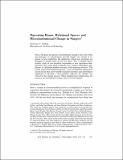Operating Room: Relational Spaces and Microinstitutional Change in Surgery
Author(s)
Kellogg, Katherine C.
DownloadKellogg_Operating Room_AJS.pdf (266.9Kb)
PUBLISHER_POLICY
Publisher Policy
Article is made available in accordance with the publisher's policy and may be subject to US copyright law. Please refer to the publisher's site for terms of use.
Terms of use
Metadata
Show full item recordAbstract
One of the great paradoxes of institutional change is that even when top managers in organizations provide support for change in response to new regulation, the employees whom new programs are designed to benefit often do not use them. This 15‐month ethnographic study of two hospitals responding to new regulation demonstrates that using these programs may require subordinate employees to challenge middle managers with opposing interests. The article argues that relational spaces—areas of isolation, interaction, and inclusion that allow middle‐manager reformers and subordinate employees to develop a cross‐position collective for change—are critical to the change process. These findings have implications for research on institutional change and social movements.
Date issued
2009-11Department
Sloan School of ManagementJournal
American Journal of Sociology
Publisher
Wiley Blackwell
Citation
Kellogg, Katherine C. “Operating Room: Relational Spaces and Microinstitutional Change in Surgery.” American Journal of Sociology 115.3 (2009): 657–711. © 2009 by The University of Chicago
Version: Final published version
ISSN
0002-9602
1537-5390